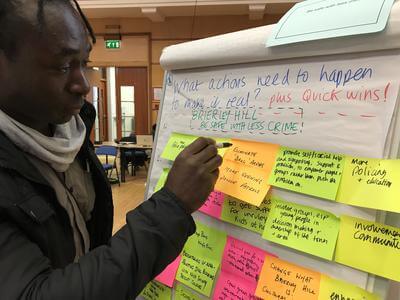
The Dudley People's Panel1 was formed to discuss the future of Dudley and Brierley Hill Town centres. Citizens broadly reflecting the population of Dudley borough met over two weekends in November and December to discuss the issues and question experts before coming up with detailed recommendations to present to councillors. A larger proportion of residents were recruited from Dudley and Brierley Hill due to the focus of the question on these two town centres. They were:
| Participants | Participants | Participants |
|---|---|---|
June, Dudley | Michelle, Dudley | Leslie, Dudley |
Raymond, Dudley | Laura, Brierley Hill | Doris, Other |
Ellie, Other | Ross, Other | Kish, Dudley |
Prince, Dudley | Andrew, Brierley Hill | Keith, Brierley Hill |
Roy, Dudley | Sharon, Dudley | Ashleigh, Dudley |
Leanne, Brierley Hill | Ashley, Other | Verna, Brierley Hill |
Michael, Other | Carl, Brierley Hill | Lisa, Brierley Hill |
George, Other | Richard, Brierley Hill | Pamela, Other |
Alan, Brierley Hill | Helen, Dudley | Barbara, Dudley |
Kerry, Brierley Hill | Martin William, Brierley Hill | Terrance, Other |
Robert, Dudley | Amret, Dudley | Steven, Brierley Hill |
April, Dudley | Kester, Other | Keith, Brierley Hill |
Veronica, Brierley Hill | Safiyan, Other | Stephen, Brierley Hill |
Kerry-Ann, Dudley | Sharon, Dudley | Paul, Dudley |
This report sets out what the People's Panel did and what proposals they put to the council. We have sought to represent what people said and concluded as faithfully as possible without adding our own analysis or interpretation. The Dudley People's Panel was a citizens' assembly deliberative democracy process.
Dudley Council2 provides local government services to the approximately 320,000 residents of Dudley borough. The council has 72 councillors, three for each of the 24 wards in the borough and operates the ‘Leader with Cabinet' model. Dudley Council wanted to run the People's Panel in order to give members of the public more say over decisions that affect them and their communities. As part of this, the council were thrilled to be one of only three councils selected by the government to take part in the Innovation in Democracy Programme. Councillors will use the information provided by the People's Panel to help them decide what to do in the short, medium and long-term to make the borough's town centres vibrant and welcoming.
The Democratic Society3 (Demsoc) works for more and better democracy, where people and institutions have the desire, opportunity and confidence to participate together. They work to create opportunities for people to become involved in the decisions that affect their lives and for them to have the skills to do this effectively. Supporting governments, parliaments and any organisation that wants to involve citizens in decision making to be transparent, open and welcoming of participation. The Democratic Society ran the People's Panel - facilitating and designing the process by which the panel members learned, considered and came to recommendations for making Dudley and Brierley Hill town centres places that are vibrant, welcoming and somewhere they are proud of. They also wrote this report.
The Sortition Foundation4 promotes the use of sortition (random selection) in decision-making. They were responsible for recruiting people to take part in the People's Panel and introducing them to the process making sure they were comfortable to participate ahead of the first weekend. Their aim was to ensure the citizens' assembly was broadly representative of the local population.
The Dudley People's Panel was supported by a range of organisations as part of the The Innovation in Democracy Programme5 (see below). This included Close-Up Research & Film6, Involve7, mySociety8, The RSA9 and Renaisi10. Close-Up Research & Film have documented the process of the Dudley People's Panel through image and film, with a film about the programme being released shortly. Involve provided design and facilitation support and guidance throughout the process. mySociety have worked behind the scenes supporting the work of the panel using digital tools, as well as digitising this report in various formats. The RSA have supported the communications about the Dudley People's Panel and hosted peer learning events for the full cohort of programme councils. Finally, Renaisi have worked with the UK Government to evaluate the programme and its effectiveness in innovating local democracy.
Dudley Council was awarded funding and support from the UK Government's Innovation in Democracy Programme to hold this citizens' assembly. The Innovation in Democracy Programme (IiDP) is trialling innovative models of deliberative democracy to involve residents in local government decision-making. It is supporting three local authorities to open up a key policy decision to citizen deliberation, complemented by online engagement. IiDP is jointly delivered by the Department for Digital, Culture, Media and Sport and the Ministry of Housing, Communities, and Local Government. For more information on the support provided, please see Annex 1.
Thank you to everyone who was involved in making the Dudley People's Panel on the future of Dudley and Brierley Hill town centres happen, including panel members, expert leads and contributors, facilitators, the support team, funders, advisory group members and contributors to evidence gathered ahead of the panel convening. Thanks also to the venue staff at the Copthorne Hotel Merry Hill and Dudley College The Broadway.

Dudley People's Panel brought together 40 randomly selected residents from Dudley borough during November and December to develop a set of recommendations for making Dudley and Brierley Hill town centres vibrant and welcoming places to be. The recommendations will also support the further development of the borough's Forging a Future for All vision to create vibrant towns and neighbourhoods across the borough by 2030.
This work of the People's Panel is presented in this report which will be presented to Councillors at Place Scrutiny Committee in January 2020 and Cabinet in February 2020. Councillors will then use these recommendations to help them decide what to do in the short, medium and long-term to make the borough's town centres vibrant and welcoming places to be.
The Dudley People's Panel was asked to address 2 key questions:
Meeting over two weekends, the People's Panel heard evidence, deliberated and made a set of proposals and recommendations to the council for achieving their vision for Dudley and Brierley Hill town centres.
Panel members voted on their key success proposals, using a ballot process. The ballot paper question was, ‘To what extent do you support or oppose the following proposals to make Dudley and Brierley Hill town centres places that are vibrant, welcoming, and somewhere we are proud of?'
The results showed that all 12 proposals were well supported by People's Panel members, with 11 out of the 12 proposals receiving over 80% support. Only Dudley's proposal, ‘having a fully extended Black Country Living Museum with green spaces and activity areas', received less than 80% and the greatest proportion of opposed votes.
Dudley - 6 key success proposals ranked in order of total support. The top 3 (highlighted) were further developed for presentation to council officers present at the People's Panel:
Brierley Hill - 6 key success proposals ranked in order of total support. The top 3 (highlighted) were further developed into recommendations for presentation to the council:
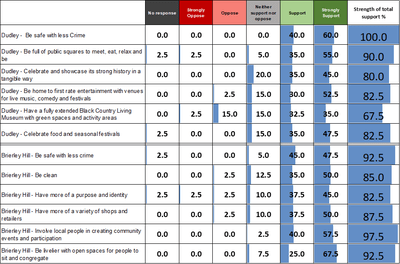
Dudley has two proposals which received joint 82.5% support (support and strongly support combined), however ‘celebrate food and seasonal festivals' total votes included a ‘no response' count - therefore it was not included in the top key successes for Dudley.
Members of Dudley People's Panel have been invited to stay engaged with the council to support the implementation of their proposals going forward. This includes being invited to present their report to Councillors in early 2020 and participate in a focus group discussion about the work of the council and how it could improve at part of their Local Government Association Corporate Peer Challenge on Thursday 23 January.
In October, letters were sent to 10,000 randomly selected households, inviting people aged 16 and over, to register their interest in becoming a People's Panel member.
The members of the People's Panel were recruited by The Sortition Foundation on behalf of The Democratic Society through a civic lottery sent to 10,000 address across the Dudley borough. Households which received the invitation were able to register their interest in participating. The Sortition Foundation then randomly selected 50 individuals from the pool of responses who broadly represented a cross-section of Dudley's demographic profile in terms of age, gender, geography, household type, occupation, disability and ethnicity.
A final total of 40 panel members completed the two weekends.
Panel members were given £150 via BACS transfer at the end of each weekend (£300 in total), to incentivise, retain and recognise their commitment and thank them for their involvement. The programme also covered the cost of childcare, care for those who had caregiving needs and all travel expenses.
A full on-boarding and induction process was carried out by The Sortition Foundation on behalf of The Democratic Society to ensure that panel members experienced a safe, supportive and caring environment. The Democratic Society takes safeguarding, support and care responsibilities seriously and provided extra support to young people under the age of 18 and vulnerable adults to make sure individuals could participate equitably.
Most communication was carried out with panel members by email and phone. However, for those without email, contact was made via post.
Dudley Council worked with officers from The Sortition Foundation and The Democratic Society to create and issue every panel member with a Dudley People's Panel Handbook - which gave full information about the process including frequently asked questions.
The People's Panel was recruited to form a ‘mini-public' version of the demographics of Dudley borough. The panel members selected against 7 categories; gender, age, geography, occupation, household type, disability and ethnicity.
The pie charts below display the demographic profiles of the people Dudley Council serves using the latest available Census data. The Sortition Foundation were able to recruit panel members to be broadly representative of the community by matching them to the demographics of Dudley borough.
Population of Dudley borough (left) Dudley People's Panel (right)




An independent advisory group was formed to work with Dudley Council and The Democratic Society in agreeing the overall shape of the evidence and appropriate content. Their specific tasks were:
The members of the Advisory Group were:
From 2 to 29 September 2019, the council used an online survey to seek the views of the wider population about the future of Dudley and Brierley Hill town centres and what evidence they felt the People's Panel should hear and consider. 82 responses were received for Dudley town centre and 43 for Brierley Hill town centre. The Advisory Group considered the responses to this survey to support their development of the People's Panel plans, evidence and materials. Members of the People's Panel also received a copy of the survey results during weekend two to help them in developing their final recommendations.
In between weekend one and weekend two, a workshop was held with members of Dudley Youth Council to seek their views on the emerging priorities of the People's Panel. Representatives from the Youth Council then attended the People's Panel during weekend two as lived experience experts to share their thoughts. Older residents from the borough also attended weekend two as lived experience experts.
Evidence was presented by a range of experts during each of the four days, alongside conversations with a number of local representatives from community groups, service providers and organisations sharing their experiences.
Evidence from expert presenters was live streamed to Dudley People's Panel YouTube Channel and is available to view at: https://www.youtube.com/channel/UCIIPE122JkkywEQJeGglh7g
Observers were present throughout both weekends and were able to hear the evidence giving and observe the process in action. They were not allowed to listen in to table discussions or approach members of the People's Panel in order to prevent interruption or undue influence. Observers were both individuals and organisations with an interest in the panel question and/or process of running a citizens' assembly. There was a range of observers, who came from the local area and from national organisations.
The Dudley People's Panel met over two weekends (2nd & 3rd November and 30th November & 1st December) enabling panel members to take part in over 24 hours of learning, deliberation and decision-making. The process was designed by The Democratic Society, with support and input from Dudley Council officers, the Advisory Group and Involve.
Each session was led by experienced lead facilitators, Mel Stevens from The Democratic Society and Tim Hughes and Suzannah Lansdell from Involve. Tables were facilitated by a mixture of council staff (who were trained by Involve ahead of the first People's Panel session) and independent facilitators. There were 6 table facilitators for each session who facilitated the conversations on tables of six to nine panel members. Panel members were sat according to a seating plan. This was changed on each of the four days, to ensure they got to hear and converse with a variety of views and perspectives from other panel members and to ensure a mix of demographics at the tables.
Across the four days, the panel members heard and discussed a range of evidence from experts, residents, community groups, local businesses and the council, before developing their recommendations for improving the town centres.
Each weekend had a specific focus, with the first weekend paying particular attention to understanding the broader context of the changing nature of town centres and hearing about regeneration projects already planned for the borough. Panel members discussed their current experience of Dudley and Brierley Hill as well as their aspirations for them to be successful town centres.
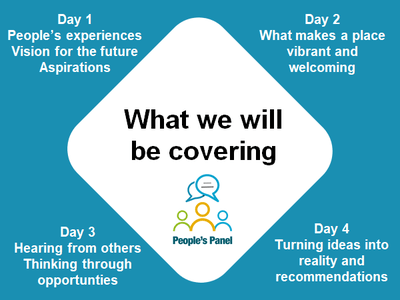
The second weekend built on the People's Panel's 12 key successes, exploring them in more detail with a range of speakers and local experts, including opportunities and constraints. Panel members then worked on defining actions to start enabling the successes they want to see, including implementation factors and timeframes using design poster tools in table groups. Panel members were then given the opportunity to vote using ballot papers to say how much they, as an individual, strongly opposed or strongly supported each success proposal with the most strongly supported worked up into recommendations.
Each weekend was designed so that a range of outputs were created from each stage of deliberation and to feed into the work of the People's Panel in reaching a set of recommendations for the council.
Table 1: Weekend one inputs and outputs
| The inputs | The outputs |
|---|---|
|
|
Table 2: Weekend two inputs and outputs
| The inputs | The outputs |
|---|---|
|
|
The first day of the Dudley People's Panel introduced participants to the purpose of the weekends and an explanation of the process they would be taken through; including how the sessions were informed by Dudley Council's 2030 borough vision strategy11.
Following an opening welcome, the lead facilitators introduced panel members to the role of the People's Panel, how it is funded and what happens to the recommendations it produces. A simple icebreaker helped participants get to know each other around their tables and share initial thoughts about the town centres. Using maps, each person added a sticker to show where they live and which parts of the towns they use. Lead facilitators gave details on the overall questions its members were being asked to examine and outlined what would be covered at each weekend.
To set the weekends in motion, the People's Panel were asked to think and discuss what they thought was important for having a good conversation. These were then shared to create a guideline to support constructive and respectful conversations over the 4 days. These were typed up and displayed around the room.
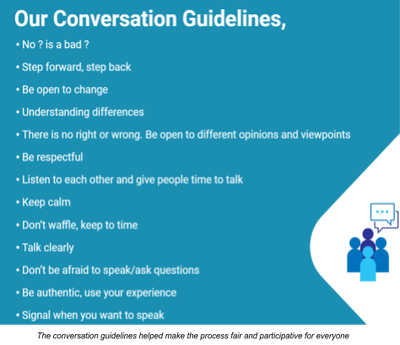
The morning began with Cllr. Angus Lees,Cabinet Member at Dudley Council, giving context to the People's Panel, saying how important it is for feeding into council decision making. Panel members then heard a presentation from Deborah Harkins,Director of Public Health and Wellbeing, Dudley Council, on the Borough Vision and what is already happening in the area.
Following the presentation, participants were asked to share key points and questions at their tables, prioritising one question to ask speakers during the Q&A. All of the questions that were not answered on the day, were recorded and given to the council to write responses to send to the panel members.
Table discussions on people's thoughts about what Dudley and Brierley Hill town centres are currently like were next, with panel members asked to capture ‘what is great and not so great'. These comments were clustered into themes on flipchart for members to see the range of views and commonalities. This resulted in resulted in a set of statements about what they thought town centres are like currently.
For the afternoon, panel members saw presentations on town centre regeneration projects planned over the next 3-5 years from Vicky Smith,Planning and Regeneration, Dudley Council and Rose Rees,Head of Engagement & Skills, Midland Metro Alliance.
Following this, the people's panel was asked to discuss what they thought life would look like with all these things in place and what these changes might mean. Speakers were on hand to answer questions from panel members during their discussions, or clarify points made in their presentations. The key points from each table discussions were collated and clustered, with the tables asked to share their top 3 points that they thought would make the most positive difference and the reasons why with the whole room.
Next, a presentation was given on other examples of investment impacting on town centre regeneration, including case studies of areas across the UK from Julia Foster, Managing Partner, David Lock Associates. Members had further opportunity to ask questions before a table exercise based on everything they had heard during the day.
On each table, members were asked to discuss what they thought success would look like for Dudley and Brierley Hill town centres and what they would like to achieve for each of them. The aim was to start building a vision for the future of Dudley and Brierley Hill, listing three key outcomes they would prioritise for each area. These were shared by a representative for each table with the whole room.
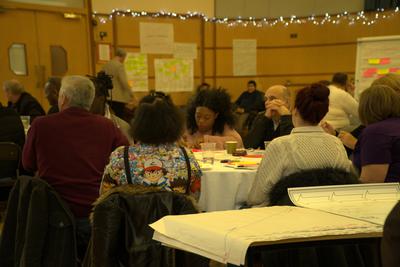
From here, the session ended with 36 priority outcomes identified from the panel members; 18 for each of the town centres.
Day 2 started with reviewing what has happened previously in the town centres and what has changed. Speaker Julia Fosterreturned to describe what has happened before in previous plans as part of Dudley and Brierley Hill Development Frameworks.
Members listed things they found interesting/important or didn't know and shared these with each other in table discussions.
A range of speakers shared community hopes and ideas on what they thought would make the town centres successful. They were positioned in different parts of the room for members to rotate around like a carousel, covering four themes in relation to town centres:
In the afternoon, the panel members spent time sharing reflections from the carousel exercise, in particular things that surprised them and things they found interesting. This was to help them define ingredients for making a town centre vibrant and welcoming.
Before this exercise, members reviewed the list of 36 items of what success should look like for Dudley and Brierley Hill town centres. This was to remind them which they thought were most important and allow time for some refinement and last-minute changes. A couple of edits were made to the list to avoid ambiguity of successes. Due to this, the vote included 24 outcomes for each town centre. Panel members then used their phones to choose 8 each, using the online voting platform Mentimeter12. There was a separate vote for each of the Town centres, resulting in 12 priority successes for each town centre; 6 of the outcomes from each town which received the most support.
Results were displayed immediately on the screen, leading to discussions on tables about the 12 outcomes identified as having the highest levels of support. for each of the Town centres.
The day ended with a final set of speakers. Liz Dickinson,Planning and Regeneration, Dudley Council and Dan Murphy, Centre Manager, Merry Hill who spoke about the role and value of local providers. Steve Smith,Founder of Poundland, shared his experience of being innovative, including what he had learned, challenges he had faced and how innovation has made a difference.
After prioritising questions for the speakers, panel members concluded the session by defining the ‘key ingredients' that think are needed to make the town centres somewhere that is vibrant, welcoming and somewhere people are proud of. One ‘key ingredient' per table was shared with the whole room, before the second day was closed by the lead facilitator.
Members were encouraged to write themselves a postcard reminder to help them remember what they thought was important from weekend one for reviewing at the start of the second weekend.
Any people or topics members thought were missing were shared by members with their table facilitators - making it possible to try to address gaps identified for days 3 and 4.
After a recap of the first weekend from the lead facilitators, Dudley's People's Panel were reminded of the aims of the panel and the timeline of how its recommendations would be shared with the council. Panel members were encouraged to have an active role in presenting their work as part of this process.
Before focussing on the 12 priority successes that had been produced from the first weekend, members heard presentations from 3 speakers, with a Q&A session afterwards.
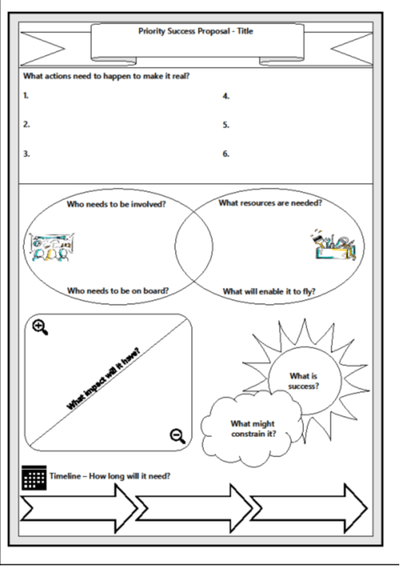
Figure 1: Proposal template
Keith Horsfall,Black Country Radio spoke on the role of Arts, Culture and Entertainment, Pete Bond,Transport for West Midlands, addressed public transport and Dave Wesson,Street Cleansing, Dudley Council gave a presentation on the value of volunteer litter picks and In Bloom.
Following this, a proposal template was given to each table to start planning actions and resources that would be needed to deliver the priority successes and tables were randomly allocated 2 priority successes to work on. Keith, Pete and Dave were on hand to answer questions, as well as experts representing older people, younger people and a council officer with results from a residents' online survey on the topic of Dudley and Brierley Hill town centres.
Members shared ideas on actions and quick wins, potential positive and negative impacts and blockers and or constraints that might make success difficult to happen.
Before breaking for lunch, members rotated around all the tables to add their thoughts and ideas to each poster template if they thought something was missing or needed editing.
In the afternoon, speakers included Corin Crane,Black Country Chamber of Commerce, talking about the role of local businesses and Amit Bratch,Senior Health Planner for Dudley Council, talking about planning in relation to town centres.
After a question and answer session, members continued to rotate around the 12 poster templates, completing each section including what would help make it a success, resources and enablers, who would need to be involved and a timeline for activity.
The day started with a panel who spoke about the role of communities in making Town centres thrive and also improve community safety.
Sue Haywood,Head of Community Safety, and Sarah Owens,Senior Health Improvement Practitioner, both from Dudley Council talked about the role of the council in supporting communities to work together with the council. They were available throughout the day for questions as groups developed and finalised their 12 priority success proposal posters.
By rotating around each table, panel members gave input to every topic proposal.
Before lunch, 2 ballot papers - one for Dudley and one for Brierley Hill - were issued for panel members to vote on their key success proposals. The ballot paper question was,
‘To what extent do you support or oppose the following proposals to make Dudley and Brierley Hill Town centres places that are vibrant, welcoming, and somewhere we are proud of?'
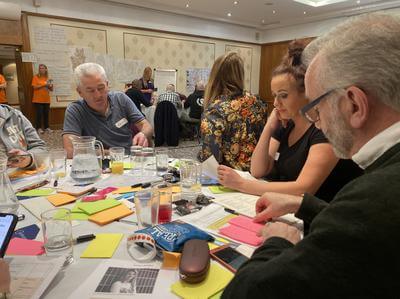
Figure 2: Example ballot papers
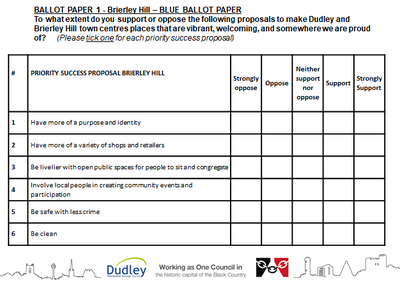
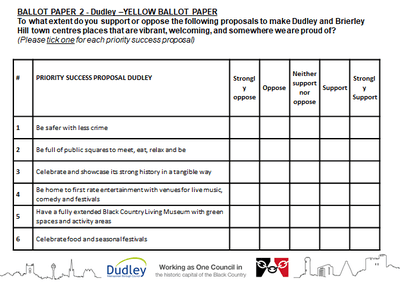
Over lunch, ballots were collected, and the results counted and then presented to the panel at the beginning of the afternoon. This enabled participants to see the strength of support against each of the proposals and also to see that there were some different opinions.
The proposals that received the strongest levels of support were focused on for the next exercise, where panel members were asked to visit each proposal and write down why it was important to them personally.
Then they went back to their tables to work in small groups, where they had been randomly allocated one of the top scoring proposals, theming people's views and using them to inform the narrative for recommendations.
For the final part of the day, panel members presented their recommendations for the most strongly supported success proposals to the following officers; Deborah Harkins,Director of Public Health and Wellbeing,Paul Mountford,Head of Planning and Regeneration,_ Sue Hayward,_Head of Community Safety andVicky Smith, Head of Projects and Delivery. Council officers received the presentations and asked each small group a question. Deborah then shared her thanks and asked participants about their experience of taking part.
Day four ended with the council sharing further opportunities for the People's Panel to stay involved, including presenting its proposals and recommendations to the council at the Place Scrutiny Committee on 29 January 2020, 18:00 at Dudley Council House and theCabinet on 12 February 2020, 18:00 at Dudley Council House.
The council also invited the panel to participate in a focus group discussion about the work of the council and how it could improve at part of their Local Government Association Corporate Peer Challenge on Thursday 23 January, 2.30 – 4.00 at Dudley Council House.
A variety of outputs and results were created over the duration of the 4 days, each informing the next discussion and activity ending in the final recommendations to the council.
The results are shown here, in the order that the People's Panel undertook the discussions and activities.
On day one, panel members worked on their tables to talk about the current situation in Dudley and Brierley Hill Town centres. This resulted in two lists of ‘great' and ‘not so great' for each of the Town centres.
Table 3: Dudley town centre great and not so great list
| Dudley Town centre - Great | Dudley Town centre - Not so great |
|---|---|
|
|
Table 4 Brierley Hill town centre great and not so great list
| Brierley Hill Town centre - Great | Brierley Hill - Not so great |
|---|---|
|
|
People's Panel members worked on tables with their facilitator on Day 1 and 2 to think about the evidence they'd heard from speakers so far and consider what their vision of success was for thriving town centres in Dudley and Brierley Hill. These successes (A-X in the table below) were loaded into the online voting platform. Panel members then used their 8 votes for each town centre and a shortlist of 6 priority successes were identified for each of the town centres (12 in total).
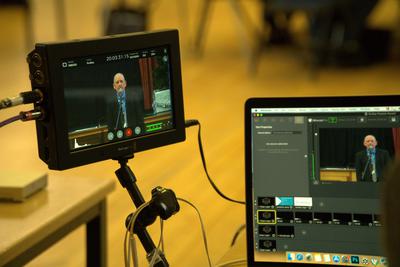
Table 5: Long list of successes
| By 2030, Dudley will… | By 2030, Brierley Hill will… |
|---|---|
A. Be safer, with less crime | A. Be varied, with interesting shop fronts |
B. Be thriving (e.g. with clubs and nightlife) | B. Be safe, with less crime |
C. Be competitive, with pop-up shops | C. Be diverse, with more pop-ups |
D. Have an interactive environment, with spaces to play, create and interact | D. Have an interactive environment, with spaces to play, create and interact |
E. Be socially inclusive and diverse | E. Be socially inclusive and diverse |
F. Be full of pop-up events | F. Be full of pop-up events |
G. Be full of public squares to meet, eat, relax and be | G. Full of public squares to meet, eat, relax and be |
H. Have affordable flexible workspace to connect and create | H. Have affordable flexible workspace to connect and create |
I. Have successful, quirky artisan markets and specialist shops | I. Have successful, quirky artisan markets and specialist shops |
J. Celebrate food and seasonal festivals | J. Celebrate food and seasonal festivals |
K. Use green transport | K. Use green transport |
L. Be an affordable place to live | L. Be an affordable place to live |
M. Be places people want to live | M. Be places people want to live |
N. Celebrate and showcase its strong history in a tangible way | N. Celebrate its strong history |
O. Have affordable modern housing | O. Have affordable modern housing |
P. Have good investment and economy | P. Have good investment and economy |
Q. Involve local people in creating community events and participation | Q. Involve local people in creating community events and participation |
R. Be home to first-rate entertainment, with venues for live music, comedy and festivals | R. Be livelier, with open public spaces for people to sit and congregate |
S. Provide space for play, especially for teens and young people which is easy to locate | S. Home to better leisure offers, like a garden centre and better night life |
T. Be more compact and centralised | T. A town which offers space to specialist, unique, quality local businesses to thrive and grow |
U. Be more pedestrian friendly | U. Be clean |
V. Have a fully extended Black Country Living Museum with green spaces and activity areas | V. Have more of a purpose and identity |
W. Be a respectable capital of the Black Country that people want to visit | W. Have more variety of shops and retailers |
X. Have green spaces | X. Have green spaces |
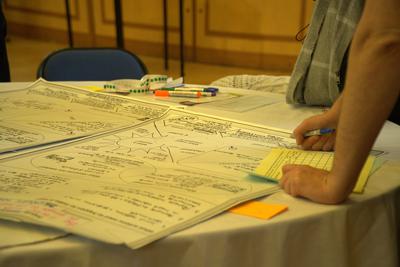
_
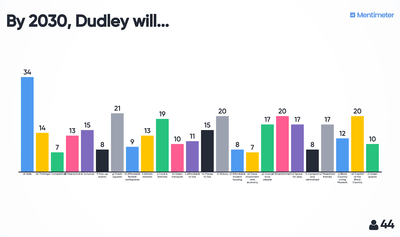
Chart 3: Results of preferential voting for Dudley
Table 6: Top 6 successes with number of votes for Dudley town centre
| Dudley Town centre - Top 6 votes | Number of votes |
|---|---|
| 34 |
| 21 |
| 20 |
| 20 |
| 20 |
| 19 |
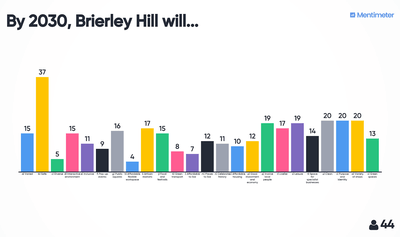
_
Chart 4: Results of preferential voting for Brierley Hill
Table 7: Top 6 successes with number of votes for Brierley Hill town centre
| Brierley Hill Town centre - Top 6 votes | Number of votes |
|---|---|
| 37 |
| 20 |
| 20 |
| 20 |
| 19 |
| 19 |
Panel members cast votes using their ballot papers on Day 4 of the People's Panel. This allowed them to vote as an individual as to how much they opposed or supported each proposal.
All of the 12 proposals received support, with 3 in Dudley receiving some votes of opposition; ‘be full of public squares to meet, eat, relax and be', ‘be home to first rate entertainment with venues for live music, comedy and festivals', have a fully extended Black Country Living Museum with green spaces and activity areas' and 3 in Brierley Hill receiving some votes of opposition; ‘be clean', ‘have more of a purpose and identity' and ‘have more of a variety of shops and retailers'.
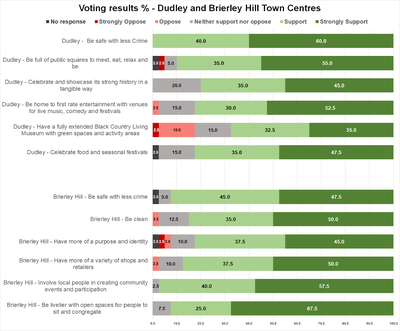
Chart 5: Results of voting on the priority success proposals for Dudley and Brierley Hill town centres combined - 40 ballot papers were received and counted
This section shows the priority success proposals that received the strongest levels of support and the recommendations that the People's Panel presented to the council. Using the data from ‘why these are important to me discussions', panel members worked on tables to prepare their final recommendations in the form of a presentation to the council.
Key message presented to the council
What actions need to happen to make it real?
| Who needs to be involved? | What resources are needed? |
|---|---|
|
|
What impact will it have?
| Positive | Negative |
|---|---|
|
|
| What is success? | What might constrain it? |
|---|---|
|
|
| Action | Period |
|---|---|
1 year |
|
3 years |
|
10 years |
|
Key message presented to the council
What actions need to happen to make it real?
Create a sculpture trail from Black Country Museum to Town centre to link Zoo, museum, college to town itself
| Who needs to be involved? | What resources are needed? |
|---|---|
|
|
What impact will it have?
| Positive | Negative |
|---|---|
|
|
| What is success? | What might constrain it? |
|---|---|
|
|
| Action | Period |
|---|---|
1 year |
|
3 years |
|
10 years |
|
Key message presented to the council
What actions need to happen to make it real?
| Who needs to be involved? | What resources are needed? |
|---|---|
|
|
What impact will it have?
| Positive | Negative |
|---|---|
Dudley still Capital of the Black Country | It can be expensive for families to visit attractions |
| What is success? | What might constrain it? |
|---|---|
Annual festival is a success with record numbers visiting Dudley | Not enough parking near venues |
| Action | Period |
|---|---|
1 year | The People’s Events Committee started and the council’s team work together on events |
3 years | Hippodrome developed and launched as part of festival |
10 years | Look back and see the history and the Hippodrome |
Key message presented to the council
Some specific actions:
What actions need to happen to make it real?
| Who needs to be involved? | What resources are needed? |
|---|---|
|
|
What impact will it have?
| Positive | Negative |
|---|---|
|
|
| What is success? | What might constrain it? |
|---|---|
|
|
| Action | Period |
|---|---|
1 year |
|
3 years |
|
10 years |
|
Key message presented to the council
What actions need to happen to make it real?
| Who needs to be involved? | What resources are needed? |
|---|---|
|
|
What impact will it have?
| Positive | Negative |
|---|---|
|
|
| What is success? | What might constrain it? |
|---|---|
| Red tape |
| Action | Period |
|---|---|
1 year |
|
3 years |
|
10 years |
|
Key message presented to the council
What actions need to happen to make it real?
| Who needs to be involved? | What resources are needed? |
|---|---|
|
|
What impact will it have?
| Positive | Negative |
|---|---|
|
|
| What is success? | What might constrain it? |
|---|---|
|
|
| Action | Period |
|---|---|
1 year |
|
3 years |
|
10 years |
|
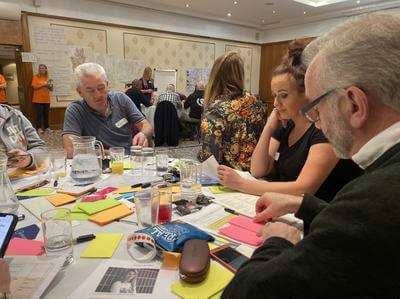
These proposals still form part of the recommendations but did not receive the highest levels of ‘support' and ‘strongly support' votes so they were not worked on at the end of Day 4 in creating recommendations to the council. They still received strong support and therefore should be considered along with the preceding recommendations.
What actions need to happen to make it real?
| Who needs to be involved? | What resources are needed? |
|---|---|
|
|
What impact will it have?
| Positive | Negative |
|---|---|
|
|
| What is success? | What might constrain it? |
|---|---|
|
|
| Period | Action |
|---|---|
1 year |
|
3 years |
|
10 years |
|
What actions need to happen to make it real?
| Who needs to be involved? | What resources are needed? |
|---|---|
|
|
| What is success? | What might constrain it? |
|---|---|
|
|
| Period | Action |
|---|---|
1 year |
|
3 years |
|
10 years |
|
What actions need to happen to make it real?
| Who needs to be involved? | What resources are needed? |
|---|---|
|
|
What impact will it have?
| Positive | Negative |
|---|---|
|
|
| What is success? | What might constrain it? |
|---|---|
| Period | Action |
|---|---|
1 year |
|
3 years |
|
10 years |
|
What actions need to happen to make it real?
| Who needs to be involved? | What resources are needed? |
|---|---|
|
|
| Who needs to be involved? | What resources are needed? |
|---|---|
* Local existing businesses | * Funding |
* Landlords | * People’s time/spirit |
* Local council | * Expertise |
* Job Centre | |
* College | |
* Market Manager | |
* Chamber of Commerce | |
* Youth Council | |
* LEP | |
* Community Groups | |
* MPs |
| What is success? | What might constrain it? |
|---|---|
|
|
How long will it need?
| Period | Length |
|---|---|
1 year |
|
3 years |
|
10 years |
|
What actions need to happen to make it real?
| Who needs to be involved? | What resources are needed? |
|---|---|
|
|
What impact will it have?
| Positive | Negative |
|---|---|
|
|
| What is success? | What might constrain it? |
|---|---|
|
|
| Period | Action |
|---|---|
1 year |
|
3 years |
|
10 years |
|
What actions need to happen to make it real?
| Who needs to be involved? | What resources are needed? |
|---|---|
|
|
What impact will it have?
| Positive | Negative |
|---|---|
|
|
| What is success? | What might constrain it? |
|---|---|
| Period | Action |
|---|---|
1 year _ _ |
|
3 years |
|
10 years |
|
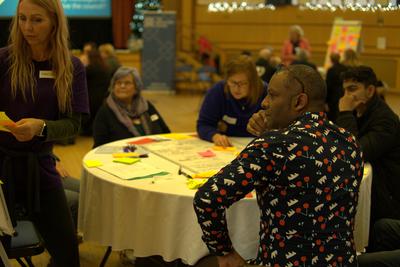
The work of the People's Panel is being evaluated by Renaisi as part of the wider evaluation of the Innovation in Democracy Programme. The full evaluation report will be made available when it is published before the end of March 2020.
Renaisi provided questionnaires13 for panel members to complete at the beginning of the People's Panel's first weekend, the end of the first weekend and at the end of the second weekend. The information will be used to provide a full evaluation of all three of the Innovation in Democracy Programme citizens' assemblies early in 2020.
The following is a snapshot of the survey data in relation to the recommendations.
Chart 6: Question: ‘I agreed with the recommendations put forward to Dudley Council'
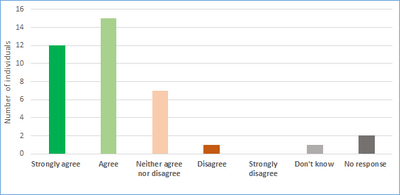
After voting, table groups discussed the reasons whythe top 3 proposals for Dudley and Brierley Hill Town centres were important to them as individuals. The following is the typed notes in the People's Panel's own words on why the top 3 proposals would make an impact in their own lives.
Dudley - Be safer with less crime - Why this is important to me
Dudley - Be home to first rate entertainment with venues for live music, comedy and festivals - Why this is important to me
Dudley - Be full of public squares to meet, eat, relax and be - Why this is important to me
Brierley Hill - Involve local people in creating community events and participation - Why this is important to me
Brierley Hill - Be safe with less crime - Why this is important to me
Brierley Hill - Be livelier with open public spaces for people to sit and congregate_ _- Why this is important to me
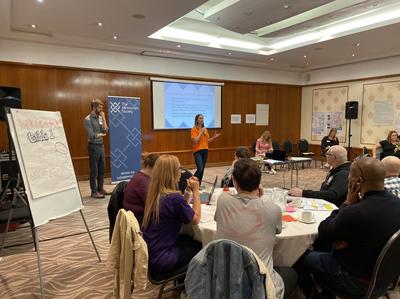
Panel members had been asked to take pictures of things in the town centres that they liked/disliked – to use as part of the table icebreaker activity on Day 3. A small number of photos were submitted to us by email afterwards by panel members for sharing.
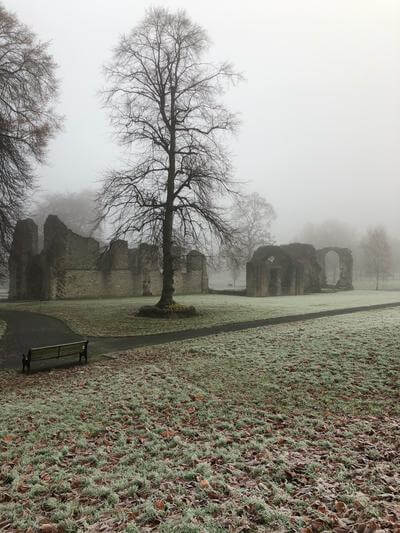
"I love it because it has a wonderful view of the historical architecture and the natural beauty of Dudley. We need this happy medium in both Dudley and Brierley Hill"
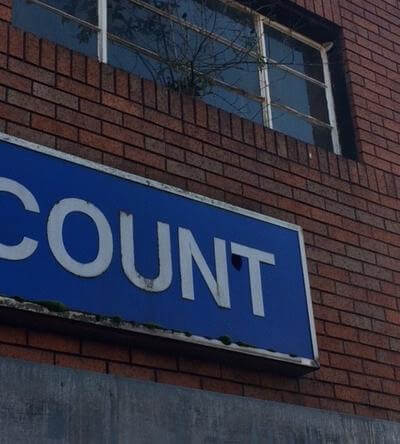
Brierley Hill
"Most of Brierley Hill high street properties with trees and weeds growing out the windows and roofs. This needs addressing asap, it's an eyesore and will prevent businesses from moving in"
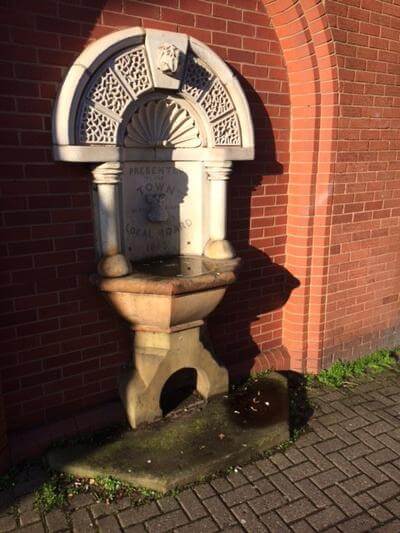
"Fountain in Brierley Hill high street, nice feature but in need of a good clean"
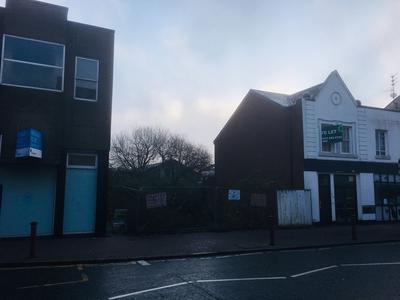
"A building was knocked down there about 15 years ago, and the overgrown space has been there ever since, with no sign of it being built on"
The Innovation in Democracy Programme (IiDP) is trialling the involvement of citizens in decision-making at local government level through innovative models of deliberative democracy. It is supporting three local authorities to open up a key policy decision to citizen deliberation, complemented by online engagement. IiDP is jointly delivered by the Department for Digital, Culture, Media and Sport and the Ministry of Housing, Communities, and Local Government.
Following an Expression of Interest process, the following local authorities were selected to be part of the Innovation in Democracy Programme:
Part of the purpose of the Innovation in Democracy programme is for local authorities to learn about what is involved in putting together a citizens' assembly.
Officers from Dudley Council therefore worked alongside The Democratic Society in the development of the Dudley People's Panel (citizens' assembly). Their involvement in the People's Panel included:
Furthermore, Dudley Council staff were trained in facilitation techniques by Involve ahead of the first People's Panel session as part of the Innovation in Democracy Programme's building capacity, skills and learning element. A table facilitator was selected to form part of the table facilitation team. This table facilitator does not work directly on Town Centre policy or strategy.
Each participating area in the Innovation in Democracy Programme has support from the Democracy Support Contractor Consortium made up of Involve, The Democratic Society, mySociety and The RSA, as well as up to £60,000 to cover the costs of implementing citizens' assemblies and online engagement. The programme is being independently evaluated by Renaisi who will publish findings when the programme completes before the end of March 2020. The following is a broad breakdown of how the funds were spent on direct costs. In addition, it shows the breakdown of the £64.5K allocated to the Democracy Support Contractor Consortium.
Table 20: Breakdown of expenditure
| Item | Cost |
|---|---|
Assembly Member recruitment – invitation package and mail out; recruitment to stratification and initial on-boarding of assembly members | £11,800 |
Assembly Member honorarium travel expenses | £19,000 |
Table facilitation / speakers / team accommodation, travel and subsistence expenses | £21,400 |
Stationery and equipment | £600 |
Venue costs | £7,500 |
_Direct cost subtotal _ | £60,300 |
Setup, support design | £25,980 |
Digital strategy support | £4,680 |
Delivery reporting | £33,840 |
_Democracy support subtotal _ | £64,500 |
TOTAL | £124,800 |
1:https://www.dudley.gov.uk/council-community/peoples-panel/
5:www.gov.uk/government/publications/innovation-in-democracy-programme-launch
11:https://www.dudley.gov.uk/media-centre/communications/your-borough-your-home/dudley-borough-vision-2030/
12:www.mentimeter.com
13:38 questionnaires were received